Related Research Articles

Luchino Visconti di Modrone, Count of Lonate Pozzolo was an Italian filmmaker, theatre and opera director, and screenwriter. He was one of the fathers of cinematic neorealism, but later moved towards luxurious, sweeping epics dealing with themes of beauty, decadence, death, and European history, especially the decay of the nobility and the bourgeoisie. Critic Jonathan Jones wrote that “no one did as much to shape Italian cinema as Luchino Visconti.”

General Gabriele D'Annunzio, Prince of Montenevoso, sometimes written d'Annunzio as he used to sign himself, was an Italian poet, playwright, orator, journalist, aristocrat, and Royal Italian Army officer during World War I. He occupied a prominent place in Italian literature from 1889 to 1910 and in its political life from 1914 to 1924. He was often referred to by the epithets il Vate and il Profeta.

Tullio Levi-Civita, was an Italian mathematician, most famous for his work on absolute differential calculus and its applications to the theory of relativity, but who also made significant contributions in other areas. He was a pupil of Gregorio Ricci-Curbastro, the inventor of tensor calculus. His work included foundational papers in both pure and applied mathematics, celestial mechanics, analytic mechanics and hydrodynamics.
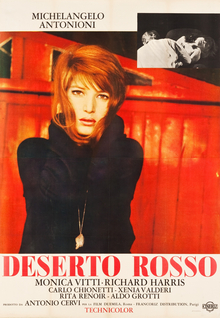
Red Desert is a 1964 psychological drama film directed by Michelangelo Antonioni and starring Monica Vitti and Richard Harris. Written by Antonioni and Tonino Guerra, it was Antonioni's first color film. Set in Northern Italy, the story follows a troubled woman who is unable to adapt to her environment after an automobile accident.
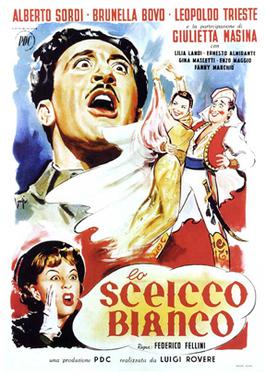
The White Sheik is a 1952 Italian romantic comedy film directed by Federico Fellini and starring Alberto Sordi, Leopoldo Trieste, Brunella Bovo and Giulietta Masina. Written by Fellini, Tullio Pinelli, Ennio Flaiano and Michelangelo Antonioni, the film is about a man who brings his new bride to Rome for their honeymoon, to have an audience with the Pope, and to present his wife to his family. When the young woman sneaks away to find the hero of her romance photonovels, the man is forced to spend hour after hour making excuses to his eager family who want to meet his missing bride. The White Sheik was filmed on location in Fregene, Rome, Spoleto and Vatican City.
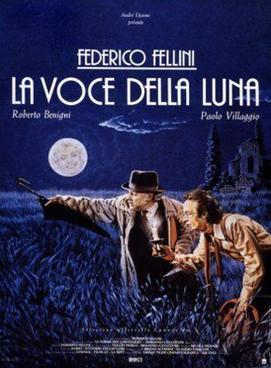
The Voice of the Moon is a 1990 Italian dramatic comedy film directed and written by Federico Fellini and starring Roberto Benigni, Paolo Villaggio, and Nadia Ottaviani. Based on the novel Il poema dei lunatici by Ermano Cavazzoni, and revisiting themes Fellini first explored in La strada (1954), the film is about a fake inspector of wells and a former prefect who wander through the Emilia-Romagna countryside of Fellini's childhood and discover a dystopia of television commercials, fascism, beauty pageants, rock music, Catholicism, and pagan ritual.
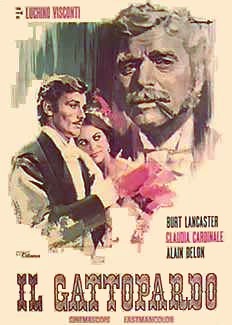
The Leopard is a 1963 epic historical drama film directed by Luchino Visconti. Written by Visconti, Suso Cecchi d'Amico, Enrico Medioli, Pasquale Festa Campanile, and Massimo Franciosa, the film is an adaptation of the 1958 novel of the same title by Giuseppe Tomasi di Lampedusa.
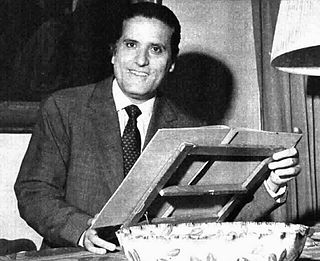
Franco Mannino was an Italian film composer, pianist, opera director, playwright and novelist.

The Innocent is a 1976 period drama film directed by Luchino Visconti and starring Giancarlo Giannini, Laura Antonelli, and Jennifer O'Neill. It is an adaptation of Gabriele d'Annunzio's 1892 novel The Intruder, about a chauvinist aristocrat who flaunts his mistress to his wife, but when he believes she has been unfaithful, he becomes enamored of her again. It was Visconti's final film, released posthumously, three months after his death in March 1976.

Adriana Asti is an Italian stage, film, and voice actress.
Pasquale "Pasqualino" De Santis was an Italian cinematographer.

Rina Morelli was an Italian film and stage actress. She appeared in 34 films between 1939 and 1976. Her husband, Paolo Stoppa, was an Italian stage and film actor, as well as a renowned Italian language dubber for American film stars.

Vittorio Mezzogiorno was an Italian actor.
Ciceronianus is a treatise written by Desiderius Erasmus and published in 1528. It attacks Ciceronianism, a style of scholarly Latin that closely imitated Cicero's style and voice. Many Ciceronians even refused to use specific words, even specific verb forms, if Cicero's writings did not include them verbatim. The Ciceronians validated this dogmatic approach by insisting that Cicero's style was the best style of Latin. In the 16th century, this style was popular among Renaissance humanists who wanted to recover Classical Latin. Erasmus also sought to defend medieval Latinists whose allegedly barbarous style the Ciceronians had ridiculed.

Caro Michele is a 1976 Italian comedy film directed by Mario Monicelli. It was entered into the 26th Berlin International Film Festival, where Monicelli won the Silver Bear for Best Director.

Rome Against Rome, also known as War of the Zombies, is a 1964 Italian peplum film directed by Giuseppe Vari.

Cassone della Torre, also called Mosca was an Italian medieval condottiero and feudal lord. A member of the Torriani family, he was Archbishop of Milan from 1308 to 1316 and patriarch of Aquileia from 1317 to 1318.

Silvia Ballestra is an Italian writer. In 2006 she won the Rapallo Carige Prize.
Giuliana Morandini was an Italian writer.
Elizabeth (Isabel) Madeleine Quigly was a British writer, translator and film critic.
References
- ↑ Encyclopedia of Literary Translation Into English: A-L. p. 336.
- ↑ The Complete Index to Literary Sources in Film. p. 105.
- ↑ "L'innocente". Rivista del cinematografo (in Italian). Retrieved 2016-03-27.